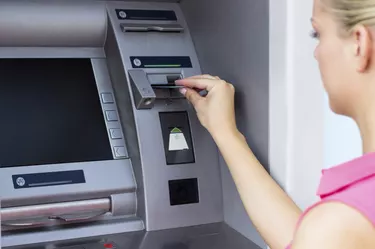
It's recommended to have your affairs in order throughout your life. In the unlikely event that something tragic should occur, it would be important that your spouse, children, parents or other intended recipients of your assets have access to them. This is where a beneficiary for a bank account comes in. You can set up as many payable-on-death beneficiaries as you like with your bank. It pays to make these decisions and sign all required paperwork now.
Beneficiary Bank Meaning
Video of the Day
According to Bank of America, a beneficiary is an individual, several individuals or even a trust to whom you intend your assets to go upon your demise. This sort of beneficiary is also called a POD, or payable on death, beneficiary.
Video of the Day
In some instances, terms associated with this person or persons on your bank accounts may also be "In Trust For" (ITF), "As Trustee For" (ATF), "Transfer on Death" (TOD) or "Totten Trust."
Choosing a beneficiary is not an overly restrictive process. In fact, nearly anyone can be a beneficiary on your bank account, from family members to friends to favorite non-profits. The beneficiary does not have to be someone situated in the United States; you can also name international individuals or entities, as well. You cannot name the co-owner of your bank account as your beneficiary, however. This means that if you and your spouse are joint owners on an account, you cannot name one another beneficiaries.
Setting Up a Beneficiary Arrangement
The process for setting up a beneficiary may vary slightly by financial institution. However, the information needed about the person you are choosing is usually the same. Typically, you must be able to provide the first and last name of the person, as well as their date of birth, their country of citizenship and their Social Security Number or Tax Identification Number. You'll also need their mailing address.
It's essential to get their basic personal information right so that they can be contacted at the time of your death to receive the funds. Even if some information, like their mailing address, has changed by that point, chances are good that the financial institution can locate them using the other details you have provided.
Your bank account beneficiary doesn't have to be a person. You can also choose an entity like a non-profit, a company, a trust or other groups. To set up such an arrangement, you'll need to provide the full legal name of the entity, as well as the appropriate Social Security Number, Federal Employer Identification Number or Tax Identification Number.
More on POD Beneficiary Rules
Not every account is eligible to have a POD beneficiary set up in this way. Any checking or savings account is eligible. If you have any Certificate of Deposit (CD) accounts, IRAs or other investment accounts, they also can have a beneficiary added.
Note that a listed beneficiary has no rights to any of your account's assets while you are alive. They are not authorized to view information about your account, either. If you would prefer to have assistance with your bank account during your life, you will need to add the desired helper as a joint account owner or grant them power of attorney.
In the event your beneficiary passes away before you do, the money in your account would enter your estate and be handled according to the instructions in your will. Laws in your jurisdiction might also come into play, as might the probate process. According to Trust and Will, probate is the process of authenticating your will and naming or identifying your executor and beneficiaries. It can be a lengthy process, but having named beneficiaries and clearly spelling out your wishes in your will can make the process much smoother.